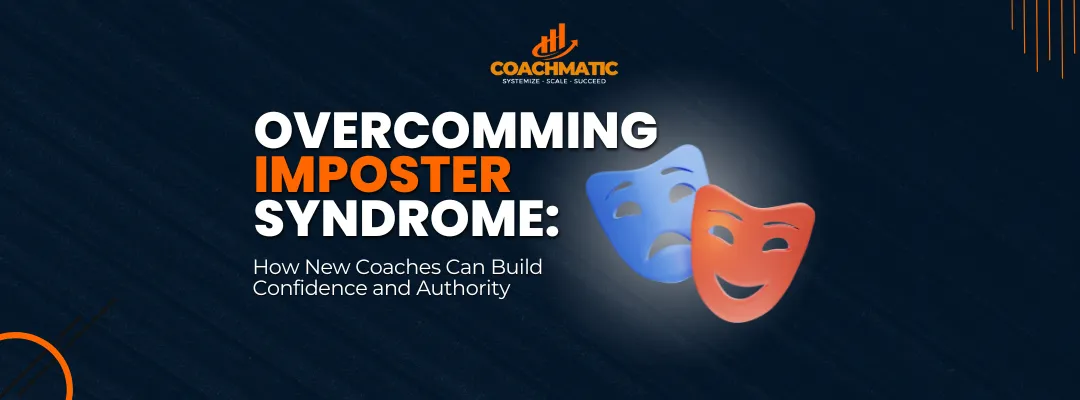
Overcoming Imposter Syndrome: How New Coaches Can Build Confidence and Authority
Overcoming Imposter Syndrome: How New Coaches Can Build Confidence and Authority
Starting your coaching journey is exciting, but for many new coaches, it also comes with a lingering challenge: imposter syndrome. You may find yourself doubting your abilities, comparing yourself to seasoned professionals, or fearing that you’re not “qualified” enough to make an impact.
The truth is, imposter syndrome is very common, even among the most successful coaches. The good news? It doesn’t have to hold you back in your career. In this blog, we’ll explore effective strategies to overcome imposter syndrome, build confidence, and establish your authority as a coach.
What Is Imposter Syndrome and How Does It Impact Coaches?
Imposter syndrome is the internal struggle of feeling like a fraud, even when you’re skilled and capable. For coaches, it often manifests as:
Self-doubt: “Why would anyone listen to me?”
Fear of failure: “What if my clients don’t see results?”
Comparisons: “Other coaches are way better than I’ll ever be.”
Left unchecked, these thoughts can prevent you from taking action, growing your business, and making the impact you know you're truly capable of.
1. Acknowledge Your Doubts (But Don’t Dwell on Them)
The first step to overcoming imposter syndrome is to recognize it. Self-doubt is completely normal, but remember, it doesn’t define you.
Action Step:
Write down your self-doubts and then actively challenge them. For example:
Doubt: “I’m not experienced enough.”
Reality: “I’ve helped [X] people, and I’m continuing to learn every day.”
Reframing your thoughts can really help shift your mindset from self-criticism to self-empowerment.
Keyword Integration: Overcoming imposter syndrome, Building confidence in coaching
2. Focus on the Value You Bring
Instead of worrying about what you lack, focus on the unique strengths and experiences you bring to your clients. Your perspective, empathy, and dedication are very valuable assets and your shouldn't take them for granted.
Reflection Exercise:
List three ways your coaching has positively impacted someone in someway —whether it’s a client, a friend, or a colleague. Revisit this inspiring list whenever that self-doubt starts to creep in.
Keyword Integration: Coaching confidence, New coach strategies
3. Take Action to Build Momentum
Unfortunately, confidence isn’t built overnight; Fortunately, it’s a skill that can be developed through frequent action. Each small success reinforces your abilities and will most certainly prove to yourself (and others) that you’re truly capable.
Action Step:
Start with low-stakes opportunities, such as - offering free or discounted sessions to help build experience. Use these sessions to refine your coaching process, build on your confidence and gather testimonials.
Keyword Integration: How to build coaching confidence, Coaching success strategies
4. Continue Learning and Growing
Another way to consider when combatting imposter syndrome is to stay committed to your growth. Investing in your professional development will not only enhance your skills but also strengthen your confidence.
Ways to Keep Learning:
Attend coaching workshops or certification programs.
Read books and listen to podcasts on the topic of coaching.
Join a coaching community to exchange tips, ideas and advice.
Pro Tip: Use a platform like 'CoachMatic' to connect to and network with fellow coaches on its community page so that you can discuss all things 'coaching' and also share ideas and seek advice when needed.
Keyword Integration: Coaching certification tips, Professional development for coaches
5. Establish Your Authority Through Content
Creating and sharing valuable content is a powerful way to position yourself as an expert in your field. When you consistently provide great insights and solutions, you naturally start to build trust with your audience.
Content Ideas for Coaches:
Blog posts with topics that address common client challenges.
Social media tips related to your niche.
Free resources like guides or templates.
Pro Tip: Focus on topics you’re passionate about and confident in—you don’t need to know everything or cover everything to provide value.
Keyword Integration: Building authority as a coach, Content marketing for coaches
6. Embrace Feedback and Celebrate Wins
Constructive feedback helps you improve, while celebrating wins reinforces your achievements. Both are essential for overcoming imposter syndrome.
How to Celebrate your Wins:
Keep a journal of your client successes or milestones you’ve reached.
Share your wins (big or small) with your community—they’ll cheer you on and amplify your confidence.
Keyword Integration: Coaching success stories, Feedback for coaching improvement
7. Surround Yourself with Support
You don’t have to navigate and suffer with imposter syndrome alone. Lean on mentors, peers, or a supportive community for encouragement and perspective when you need it.
Ways to Find Support:
Join coaching groups or forums online.
Partner with a mentor who’s been in your shoes.
Engage in peer feedback sessions to gain insights and validation.
Keyword Integration: Support networks for coaches, Mentorship for new coaches
Final Thoughts: You’re More Capable Than You Think
Imposter syndrome is essentially a mindset, not an actual reality! By acknowledging your doubts, focusing on your strengths, and taking consistent action, you can build the confidence and authority needed to thrive as a coach.
Remember, even the most experienced coaches started where you are now. Your unique perspective and passion have the power to make a difference—so step into your role as a coach with confidence.
Ready to Build Confidence and Authority as a Coach?
CoachMatic is here to help. With tools designed specifically for coaches, you can create content, streamline your business, and position yourself as an expert in your niche. Sign up for a 14-day free trial today and take the first step toward building a thriving coaching practice.
👉 Start Your CoachMatic Trial Today!


